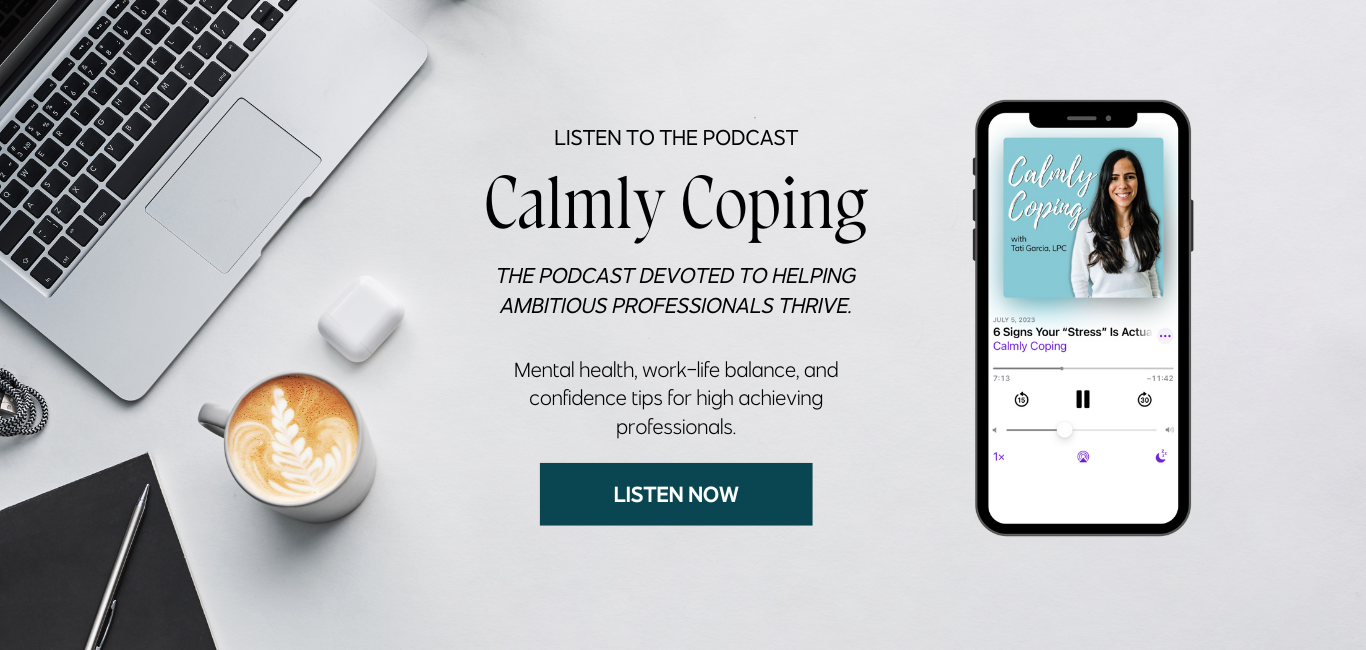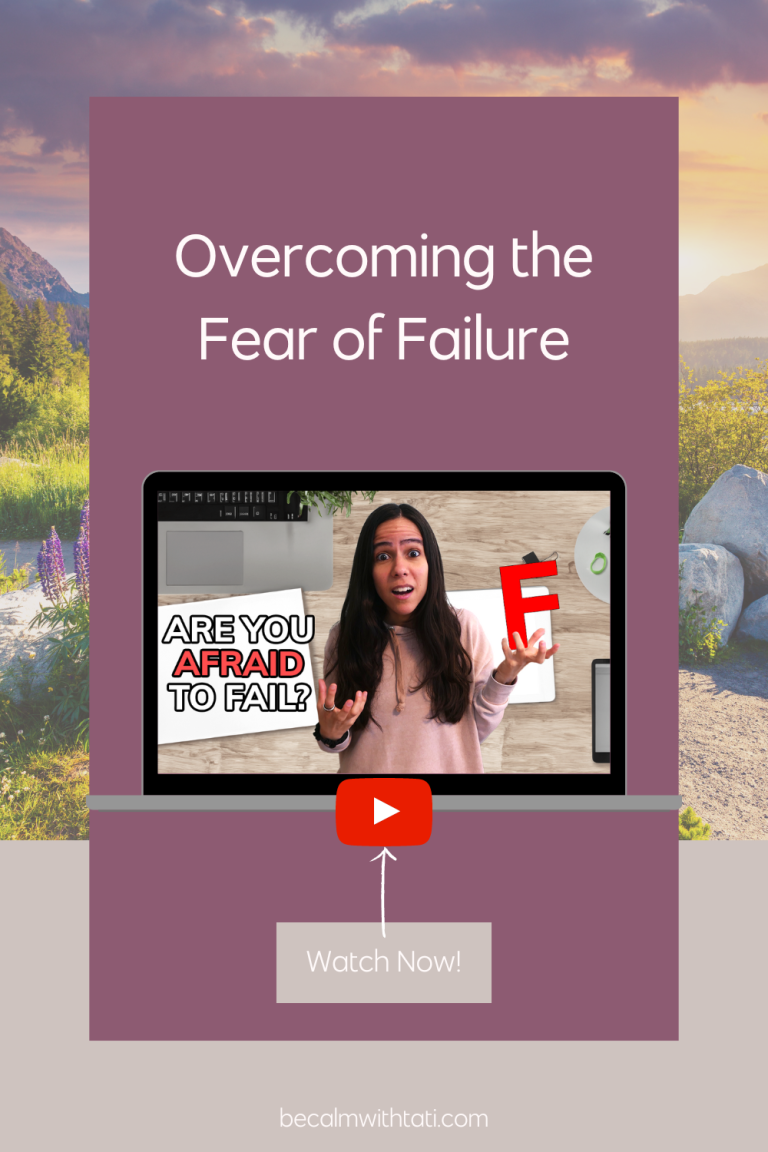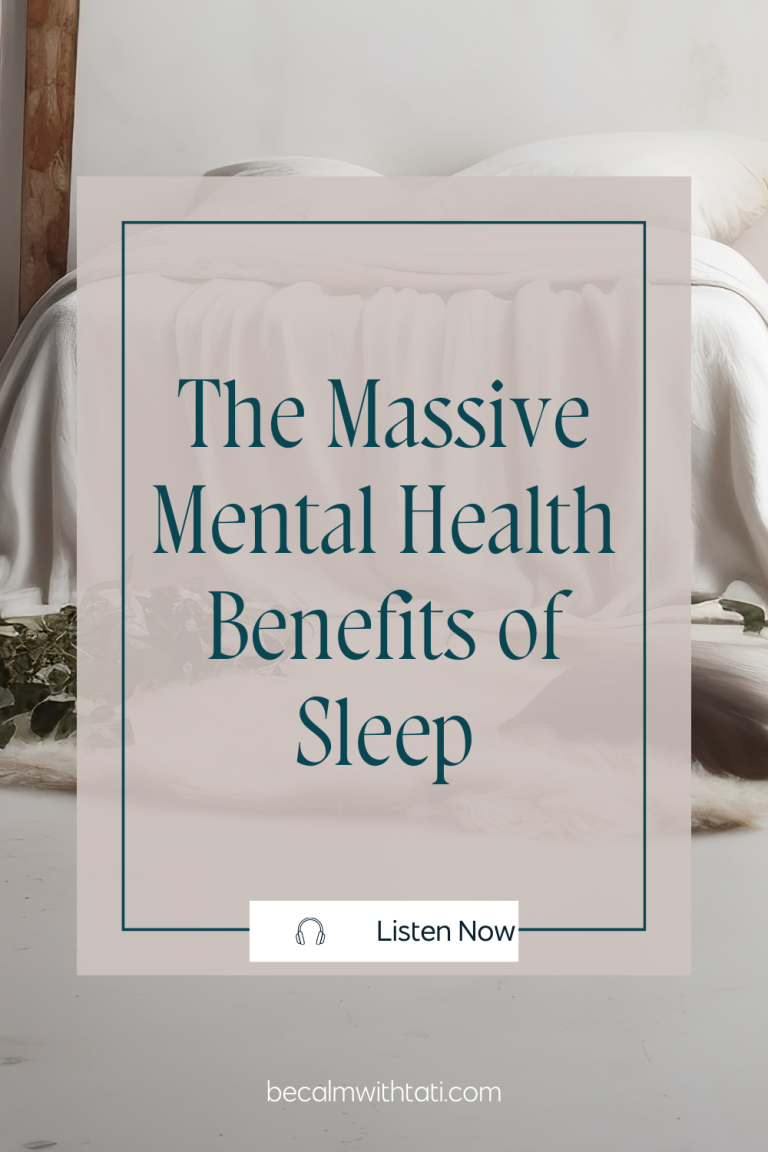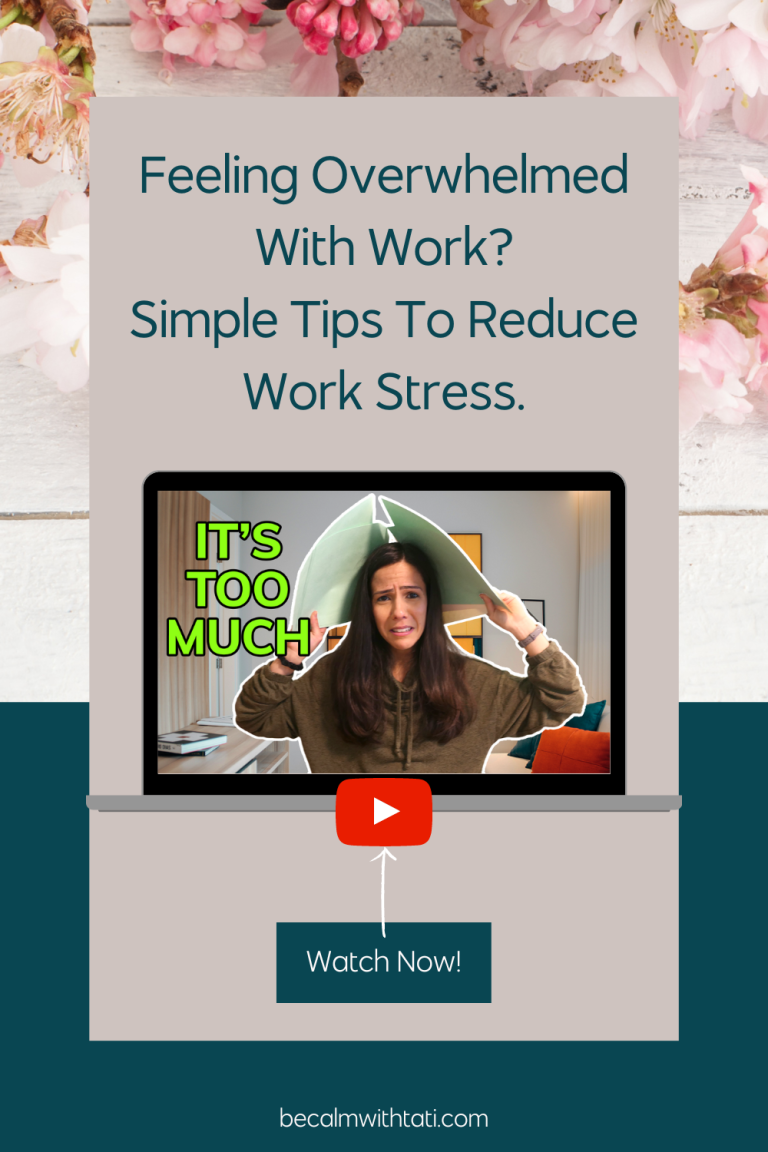Have you ever found yourself saying yes to something you didn’t really want to do—just to avoid the guilt of saying no? Maybe it was a last-minute request at work, a social invitation, or yet another commitment on your already packed calendar. Learning to say no isn’t easy, but it’s essential for protecting your energy, time, and mental health. In today’s episode, I’ll share why saying no feels so hard, how to let go of guilt, and practical strategies to say no confidently while staying true to your priorities.
In this episode, you will learn:
- Why saying no is critical for your well-being and success.
- The emotional and societal barriers that make saying no difficult.
- Actionable strategies to say no without feeling guilty—so you can reclaim your time and peace of mind.
LISTEN NOW:
🎧 CLICK HERE TO LISTEN TO CALMLY COPING WHEREVER YOU LISTEN TO PODCASTS
WATCH NOW:
▶️ Watch the Free Training: Achieve a Calm Mind, Balanced Life, and Empowered Confidence in 90 Days: Workshop
FREE TRAINING: Achieve A Calm Mind, Balanced Life, & Empowered Confidence in 90 Days
If you want to learn how to take back control of your life so you can feel calmer and more confident, and learn the tools to spend your time according to what matters most to you (no matter what your schedule is like right now)…

LISTEN, REVIEW, AND SUBSCRIBE TO THE PODCAST!

INTRO/OUTRO MUSIC: Rescue Me (Instrumental) by Aussens@iter (c) copyright 2018 Licensed under a Creative Commons Attribution (3.0) license. http://dig.ccmixter.org/files/tobias_weber/57990 Ft: Copperhead
DISCLAIMER: All content here is for informational purposes only. This content does not replace the professional judgment of your own mental health provider. Please consult a licensed mental health professional for all individual questions and issues.
Interested in diving deeper to get support for high-functioning anxiety?
I offer 1:1 coaching to help high-achievers overcoming high-functioning anxiety so they can feel calmer, more present, and have improved balance in their lives. Click here if you’re interested in learning more and getting started.
Calm, Balanced, & Confident is my comprehensive A→Z self-paced course to help high-achieving professionals overcome high-functioning anxiety so they can feel calmer, balanced, and more confident without the anxiety and overwhelm. Click here to learn more and enroll today.
Looking for ongoing support and guidance with high-functioning anxiety? The Calm & Ambitious Community is the exclusive community for high achievers with high-functioning anxiety. Click here to learn more and join us today!
TRANSCRIPT:
Click to view the episode transcript.
Have you ever found yourself saying yes to something you didn’t really want to do just to avoid the guilt of saying no? Maybe it was a last minute request at work, a social invitation, or yet another thing to add to your packed calendar. Learning to say no isn’t easy, but it’s essential to learn how to protect your time, energy, and mental health.
In today’s episode, I’ll share why saying no feels so hard, how to let go of the guilt, and practicing saying no confidently while staying true to your priorities. Welcome to calmly coping the podcast for high achievers who want to feel calm, balanced, and confident from within. I’m Tati, a therapist and coach, and I’m here to help you stop over thinking, stop overworking and crush self doubt every other week.
I share actionable tips and strategies you can implement right away to create more balance and ease in your life. Thanks so much for tuning in. Let’s get started. So first let’s talk about the importance of saying and why it’s essential to say no. That’s because it protects your well being and your focus.
Saying no prevents you from spreading yourself too thin, potentially overworking or over committing yourself, and then feeling overwhelmed as a result because you have put too many things on your plate. A lot of times we can end up in this situation when it feels like it’s too late. where saying yes to something feels like a good idea at one point, or it feels like it won’t be that much to do additional, but then once the time comes, you can end up feeling really overwhelmed, frustrated, and potentially resentful.
And another important reason to say no is that it frees up time for you to focus on the things that are important to you, whether that includes taking care of yourself or other projects or passions that you’re interested in, or spending time with your loved ones. or anything else that is a priority in your life.
When you say yes to a million things, then you’re taking time away from being able to say yes to the other things that could potentially be even more important to you. Now, why does saying no feel so hard? Maybe you fear disappointing others, and you don’t want to be perceived as being uncooperative, or unkind, or not caring.
And this can make you feel pressured in a way to say yes, or fearful of saying no. You might feel like saying yes proves your capabilities and your dedication, and that if you say no, that means that you’re not a hard worker, or you’re not a good friend, or whatever else. you are interpreting that to mean.
And it’s easy to conflate saying no with then failing others. You might feel like you’re letting people down when in reality, we all have to say no at certain points. We can’t do everything and that is just natural. In addition, you might have learned to prioritize other people’s needs over your own. And this can result in internalized guilt that you might feel.
And maybe make you feel guilty when you set boundaries or say no, because you learned that it’s important to please others, before taking care of your own needs. And you might have even learned to ignore your own needs. And as a result, you’re constantly focusing on making other people happy and doing what they want to do, but continuing to push down what it is that you really want for yourself.
Now let’s talk about reframing the guilt around saying no. Guilt can feel uncomfortable and it’s often a motivating emotion to get us to apologize for something or to change our behavior. But the thing with guilt is that it is a response to feeling like you’ve done something wrong. One way to look at it is guilt is a reaction to making changes that might feel uncomfortable and unfamiliar for you and that is a sign of growth.
If you feel guilty when you’re saying no to something that might mean that in the past this is something that you avoided doing, And now you’re facing that fear and doing the thing and it’s going to bring up those uncomfortable emotions, but that’s okay. And learning to do the thing anyway and be okay with whatever feelings come up can help you to build that muscle of saying no and feeling more confident doing it in the future.
Ultimately, saying no is an act of self respect and self worth, and it’s not an act of disrespecting others. So instead of saying something like, if I say no, my boss is going to think that I’m not a team player, consider saying something like, if I say no to this extra project, then I’ll be able to deliver better on the ones that I’m already working on.
Now let’s talk about some practical strategies for saying no. It can help to have some kind of like canned responses ready for how to say no, because in the moment it can feel really uncomfortable. If this is something that’s new for you, or if you are afraid of letting somebody down, or if you feel like you might have the tendency to over explain because you feel guilty, that’s when a simple kind of canned response can help.
And not like you’re reading from a script, but just something you can kind of keep. top of mind for those moments when you feel caught off guard or you feel like you want to say no, but you want a simple way to do so. So here are some examples. Thank you for asking, but I don’t have the bandwidth right now.
I appreciate the opportunity, but I need to focus on my current priorities. This one can be especially helpful. Let’s say if a boss wants you to help on a new project, you might say something like, I can dedicate time to either project A or project B. Which would you like me to prioritize? And next I want to talk about three steps that can be helpful when it comes to saying no.
So first is to clarify your own priorities. What is important to you? Or what do you have the time and energy for? This can help you to determine whether you want to say yes to something or no. I often will go by this saying of if it’s not a hell yes then it’s a no. If I get a request to do something or if somebody’s asking me something and I’m not like really excited like it’s a hell yes.
Then I will often say, okay, maybe that’s something that I’m either not excited, doesn’t resonate, or isn’t something that I need to be committing my time and energy towards right now because I can be committing it towards the other things that are important to me. So this can be a gauge that you use in your personal life or your professional life, depending upon how much freedom you have.
And ultimately, it’s up to you. Even if you have responsibilities being given to you by a boss or by somebody in your company or whatever the expectations are, at the end of the day, we all have a limited amount of time and energy and saying no to something doesn’t mean that you are incapable of doing the work or that you are not a good worker or that there is something wrong with you or that you are flawed or deficient in any way.
Saying no is a way of expressing the fact that I have a finite amount of time, and I can’t do everything at once. Even the most intelligent, successful people cannot say yes to everything. That is an important thing to remember. Saying no does not mean that you’re a failure, or that there is something wrong with you.
And a step of clarifying your priorities can help you to discern What do I have the time and energy for right now and what is something that is a priority to me in my life at this moment when it comes to this question? So for example, you might decline a late night work meeting in order to preserve your focus and energy for spending time with your family or for a presentation that you have the next day.
The next step is to take time to think. It can be easy to be caught off guard when somebody asks you to do something and then in the moment feel pressure to say yes and then regret it later. That’s why giving yourself time and space to process the request can really help you and prevent making an impulsive decision or saying yes, when you didn’t really want to.
So this might look like saying something like, let me check my schedule and I’ll get back to you. Or I need some time to consider this. Can I let you know tomorrow? These are simple things you can say to give yourself some time to process without feeling like you are dropping the ball. And if you’ve decided that you want to say no, the third step is to offer alternatives.
This is not a necessity, but this can be something that could be helpful if you feel like it’s not. It is something you want to offer, so maybe suggesting another timeline or date to do the thing that the person’s asking you with maybe delegating the task to somebody else or recommending another person for the task, you know, maybe saying something like, well, I can’t meet this deadline personally, but I can loop in this team member to help.
Here’s an action step for this episode, and it is a journal prompt. So I want you to write about one situation where you need to start saying no. Reflect on how saying yes to something like this in the past has affected your energy, mood, or progress, and then write how saying no would help you, and how you’ll phrase it when the situation arises.
After you’ve completed this journal prompt, you can put this into practice. This week, try and practice saying no in a small way. So for example, maybe turning down a meeting that isn’t essential, declining an invitation to a social event if you need time to recharge, or setting a boundary at work by clarifying priorities with your manager.
Saying no can feel uncomfortable, but it is one of the most powerful ways to protect your time, energy, and mental health. With practice, you’ll find that setting boundaries not only helps you to protect these things, but also helps you to feel more confident in showing up authentically and strengthens your relationships.
Start small, stay consistent, and give yourself some grace along the way. If this episode resonated with you, then please share this episode and the podcast with somebody who you think could benefit from it. And subscribe to Calmly Coping wherever you listen to podcasts or on YouTube for more tips on calming your mind, improving work life balance, and feeling more confident from within.
Thank you so much for tuning in today, and until next time, be calm. Thanks so much for listening. If you like what you heard, please share this episode with a friend. And please subscribe and leave me a review on iTunes. Also, remember to check me out online at CalmlyCoping.com and connect with me on Instagram at TatianaGLPC.
All content here is for informational purposes only. This content does not replace the professional judgment of your own mental health provider. Please consult a licensed mental health professional for all individual questions and issues. Till next time, I’m Tati, and this has been Calmly Coping.


Until next time…













